Unit 18 Read the label! Lesson35 课件(51张PPT)
文档属性
| 名称 | Unit 18 Read the label! Lesson35 课件(51张PPT) | 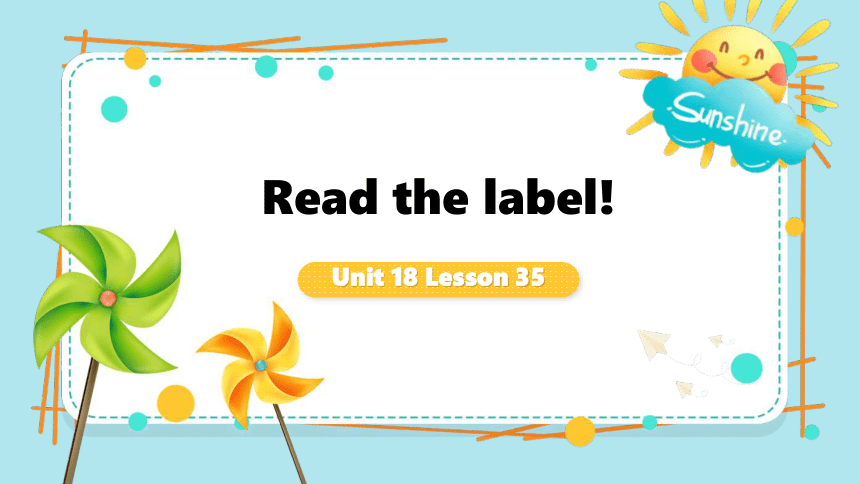 | |
| 格式 | pptx | ||
| 文件大小 | 21.3MB | ||
| 资源类型 | 试卷 | ||
| 版本资源 | 新概念英语 | ||
| 科目 | 英语 | ||
| 更新时间 | 2024-09-09 09:53:26 | ||
图片预览

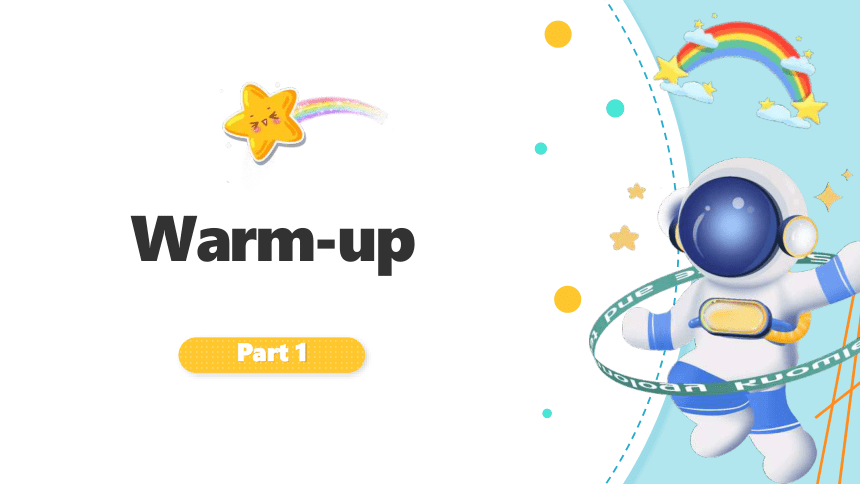
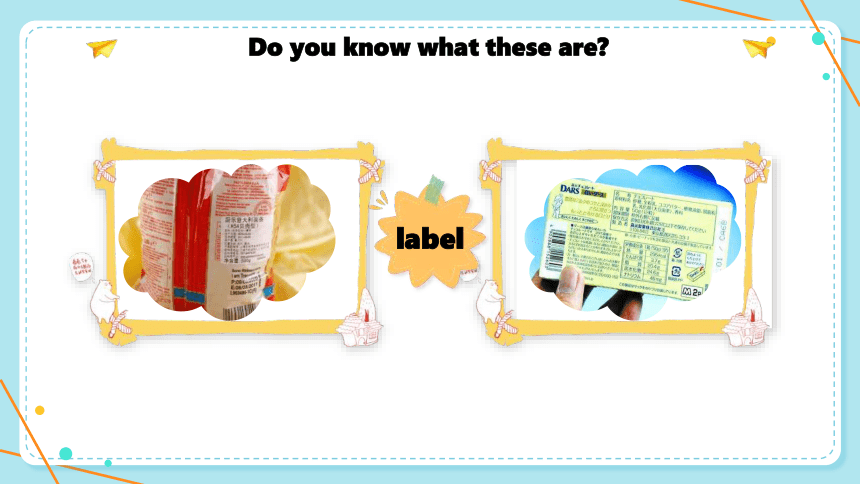
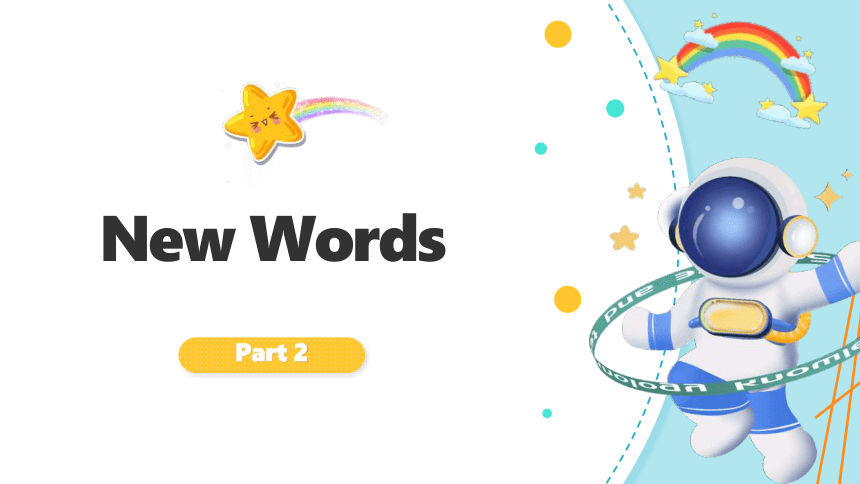

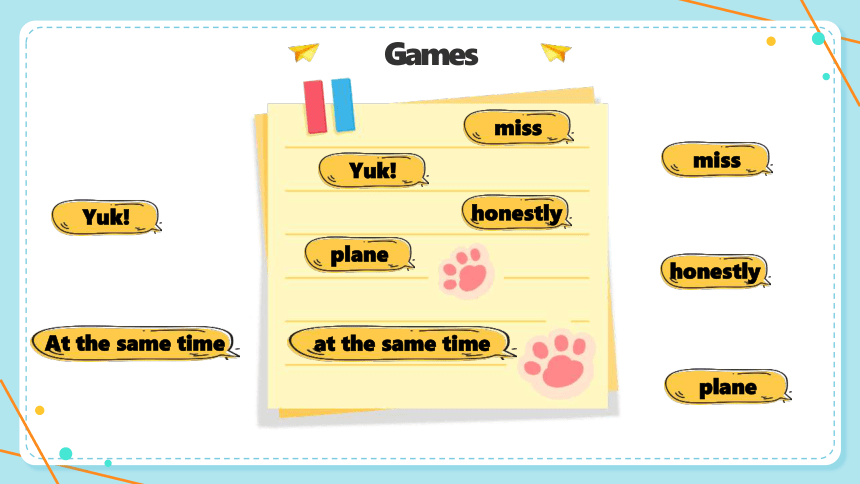

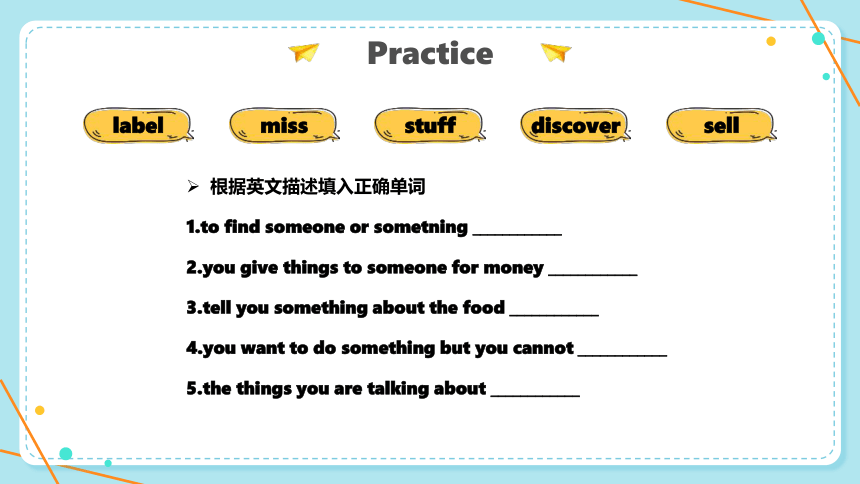
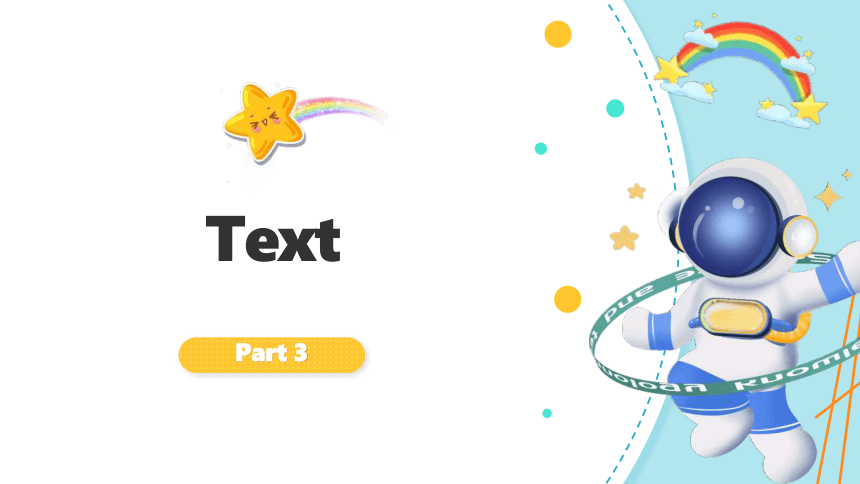
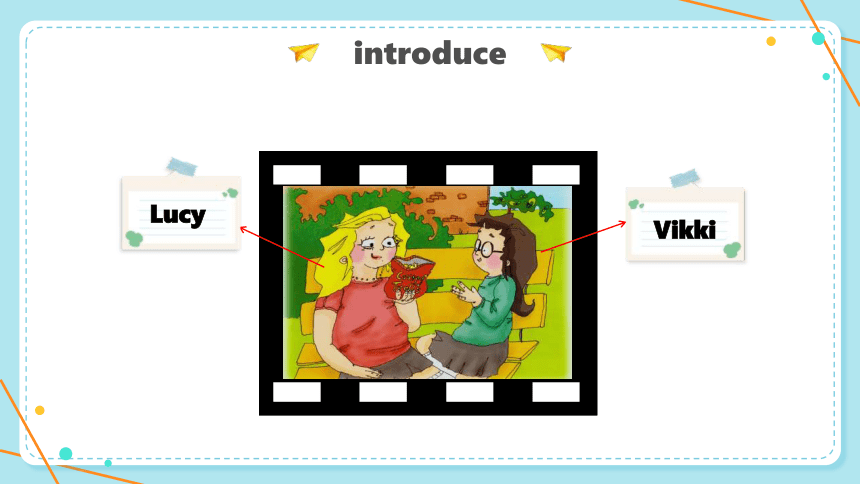


文档简介
(共51张PPT)
Do you know what these are
label
New Words
label /‘le b l/ n.标签
miss /m s/ v.错过
lunchbox /‘l nt b ks/ n.午餐饭盒
anyway /‘eniwe / adv. 无论如何
discover /d s‘k v / v.发现
at the same time / t ‘se m ’ta m/ adv. (time)同时
Yuk! / j k/ inter.呸!
honestly /‘ n stli/ adv. 诚实地
stuff /st f/ n.东西
chemistry /‘kem stri/ n.化学;化学药品
plane /ple n/ n.飞机
Games
miss
miss
honestly
At the same time
Yuk!
Yuk!
honestly
plane
plane
at the same time
Games
discover
discover
lunchbox
chemistry
label
label
lunchbox
stuff
stuff
chemistry
anyway
anyway
Practice
根据英文描述填入正确单词
1.to find someone or sometning ____________
2.you give things to someone for money ____________
3.tell you something about the food ____________
4.you want to do something but you cannot ____________
5.the things you are talking about ____________
label
miss
stuff
discover
sell
introduce
Vikki
Lucy
Watch the video!
A: When did Vikki feel really sick
B: After she read the label on the packet.
Lucy: Do you want one of these, Vikki
Vikki: No, thanks!
I ate some of those about a year ago.
Once was enough!
Lucy: Why What happened
一次就够了!
Read and Learn
Vikki: I missed breakfast that morning,
because I did my piano practice
before school.
Mum gave me my lunchbox,
and I went for the bus.
Read and Learn
miss /m s/ v.错过
lunchbox /‘l nt b ks/ n.午餐饭盒
Vikki: On the school bus I felt a bit sick.
I always feel sick on buses, anyway.
用于词尾表示概括“事情就是这样”
Read and Learn
恶心的;不舒服的
anyway /‘eniwe / adv. 无论如何
Vikki: I needed to eat something.
I looked in my lunchbox
and discovered the Crispy Trolls.
Read and Learn
discover /d s‘k v / v.发现
Vikki: I ate four Crispy Trolls,
one after another.
At the same time
I read the label on the packet.
Read and Learn
label /‘le b l/ n.标签
包装
Vikki: Then I felt really sick! Yuk!
Honestly, Lucy,
this stuff isn’t food.
It’s chemistry.
Read the label!
Read and Learn
Yuk! / j k/ inter.呸!
honestly /‘ n stli/ adv. 诚实地
stuff /st f/ n.东西
(非正式说法)
chemistry /‘kem stri/ n.化学;化学药品
L: Do you want one of these, Vikki
V: No, thanks! I ate some of those about a year ago. Once was enough!
L: Why What happened
V: I missed breakfast that morning,
because I did my piano practice before school.
Mum gave me my lunchbox, and I went for the bus.
V: On the school bus I felt a bit sick.
I always feel sick on buses, anyway.
V: I needed to eat something.
I looked in my lunchbox and discovered the Crispy Trolls.
V: I ate four Crispy Trolls, one after another.
At the same time I read the label on the packet.
V: Then I felt really sick! Yuk! Honestly, Lucy, this stuff isn’t food.
It’s chemistry. Read the label!
Listen and Follow
What happened
did piano practice
missed breakfast
went for the bus
felt a bit sick
looked in the lunchbox
discovered the Crispy Trolls
ate Crispy Trolls
read the label
felt really sick
Reading for details
What happened
did piano practice
missed breakfast
went for the bus
felt a bit sick
looked in the lunchbox
discovered the Crispy Trolls
ate Crispy Trolls
read the label
felt really sick
Reading for details
Notes on the text
“一次就够了!”
One of these is a student.
Some of these are students.
do+名词:表日常工作或职责
give+双宾语
表目的
LUCY: Do you want one of these, Vikki
VIKKI: No, thanks!
I ate some of those about a year ago.
Once was enough!
LUCY: Why What happened
VIKKI: I missed breakfast that morning,
because I did my piano practice
before school.
Mum gave me my lunchbox,
and I went for the bus.
地点状语放动词前,介绍场景,表示讲述顺序。
“恶心,想呕吐“
feel ill:“感觉身体不适“
用于词尾表示概括“事情就是这样”
need to do sth.需要做某事
Do you need to work today
Notes on the text
VIKKI: On the school bus I felt a bit sick.
I always feel sick on buses, anyway.
VIKKI: I needed to eat something.
I looked in my lunchbox
and discovered the Crispy Trolls.
“一个接一个”
表强调
表厌恶的感叹词
Notes on the text
VIKKI: Then I felt really sick! Yuk!
Honestly, Lucy, this stuff isn’t food.
It’s chemistry.
Read the label!
VIKKI: I ate four Crispy Trolls,
one after another.
At the same time
I read the label on the packet.
Vocabulary
enough
adj.充足的,足够的,充分的
enough除了可以做形容词外,还常用作副词。
其作副词修饰形容词,表示“足够地;相当地”
eg.tall enough to touch the backboard
高到可以碰到篮板
其作副词修饰副词,表示“真...”:
eg.strangely enough
真奇怪
Vocabulary
miss
v.错过
miss做动词时,除了可以表示“错过;遗漏“外,还表示”想念“:
eg.Pierre often misses the old days.
皮埃尔常常想念从前的日子。
Vocabulary
did piano practice
练钢琴
当表示习惯性、有规律地做某事时,可以用do+名词代替单独的动词;
eg.do the dishes
do my piano practice
Vocabulary
went for
去找
went是动词go的过去式
go for在文中表示“去,去找”
当他人给出几个选择时,可以用go for来表达自己的选择:
eg.-Would you like coffee or tea
-I go for coffee, please.
Vocabulary
discover
v.发现
前缀dis表示“分开,散开”
+
cover名词,表示“覆盖;封面”
=
discover
Vocabulary
a bit
有点儿
a bit+形容词 表示“有点.….”
eg.a bit strange 有点奇怪
a bit of+不可数名词 表示“一点的.…."
eg.a bit of water 一点水
Vocabulary
one after another
一个接一个
one这里泛指任何一个...有时可以更具体地表达
eg.one step after another
一步接着一步
eg.one piece after another
一件接着一件
Vocabulary
honestly
adv.真诚地;公正地
Honestly在句首表示“老实说”
等同于Honestly speaking 或 To be honest
一般过去时的用法
表示过去某一时刻或某段时间发生的动作或存在的状态;
表示过去经常或反复发生的动作;
过去
现在
将来
一般过去时
eg.He was a teacher. 他以前是老师。
Grammars
一般过去时的基本结构
第一种含有be动词,表示存在的状态;
肯定句
否定句
一般疑问句
特殊疑问句
主语+was / were +其他
主语+ wasn't / weren't+其他
Was / Were+主语+其他
特殊疑问词+was / were +主语+其他
Was +主语+……
Yes,主语+was.
Yes,主语+were.
Were +主语+……
No,主语+wasn't.
No,主语+weren't.
回答
Grammars
一般过去时的基本结构
肯定句
否定句
一般疑问句
特殊疑问句
主语+实义动词的过去式+其他。
主语+ didn't +实义动词原形+其他。
Did +主语+实义动词原形+其他。
特殊疑问词+did +主语+实义动词原形+其他。
肯定回答
Yes,主语+did.
否定回答
No,主语+didn't.
回答
第二种含有实义动词,表示动作。
Grammars
句型转换:
1. Lucy did her homework at home. (改否定句)
Lucy ________ _____ her homework at home.
2. He found some meat in the fridge.(变一般疑问句)
_______ he _______ ________ meat in the fridge
His brother came here by bus. (就划线部分提问)
______ _____his brother_______ _______
4. I saw a book on the table just now. (就划线部分进行提问)
________ ________ you ______ _____ ______ _________just now
do
Did
find
any
didn’t
How
did
come
here
What
did
see
on
the
table
Practice
实义动词过去式的变化规则
一般直接在词尾加-ed
clean – cleaned清扫
work - worked工作
watch – watched观看
以不发音字母e结尾的动词,在词尾加-d
dance – danced 跳舞
use – used 使用
bake – baked 烘焙
y变成i再加-ed
study – studied 学习
try – tried 尝试
carry – carried 运送
双写辅音字母再加-ed
stop – stopped 停止
drop – dropped 掉落
plan – planned 计划
Grammars
实义动词过去式的不变化规则
go – went 去
buy – bought 买
do – did 做
drink - drank 喝
come – came 来
eat – ate 吃
have – had 有
get – got 得到
give – gave 给
make – made 做
put – put 放置
sit – sat 坐
Grammars
Practice
用动词的适当形式填空:
I ________ (have) an exciting trip last week.
They ________ (go) home by bus yesterday.
Lucy __________(stay) at home and _____(do) some cleaning last Saturday.
4. When ________ you _________(write) this song
---I __________(write) it last year.
5. My father___________ (buy) a new computer for me yesterday.
6. ---- Who______(eat) the apple on the table
---- Jenny did.
had
went
stayed
did
write
wrote
bought
ate
did
get
got
swim
swam
drink
drank
eat
ate
make
made
spend
spent
sing
sang
buy
bought
sleep
slept
take
took
read
read
go
went
help
helped
cook
cooked
dance
danced
listen
listened
watch
watched
go
went
wash
washed
try
tried
Click on the snowflakes to remember the Past Simple form of the verbs.
Practice
1 Once was enough for her, wasn't it
2 She missed breakfast that morning,didn't she
3 Mum gave Vikki her lunchbox, didn‘t she
4 Vikki felt a bit sick on the bus, didn‘t she
5 She discovered the Crispy Trolls in her lunchbox, didn't she
6 She didn't eat ten, did she
7 She only ate four, didn't she
8 She read the label on the packet,didn't she
9 She felt really sick then, didn't she
Yes,it was.
Yes,she did.
Yes,she did.
Yes,she did.
Yes,she did.
Yes,she did.
Yes,she did.
Yes,she did.
Yes,she did.
Practice
1 Did Vikki miss lunch that morning
2 Did Vikki's dad give her her lunchbox
3 Did she feel sick in her mum's car
4 Did she eat fourteen Crispy Trolls
5 Did she read the label on the bottle
6 ls the stuff food
No,she didn’t.She missed breakfast.
No,he didn’t.Vikki’s mum.
No,she didn’t.On the school bus.
No,she didn’t.She ate four.
No,she didn’t.On the packet
No,it isn’t.This stuff isn’t food.
Practice
1.When did she eat some Crispy Trolls
She felt a bit sick.
3.What did her mother give her
4.How did she feel on the bus
2.Why did Vikki miss breakfast that morning
She did her piano practice.
Her lunchbox.
She felt a bit sick.
Practice
5.What did she discover in her lunchbox
Crispy Trolls
7.What did she do at the same time
8.What did she call the stuff
6.How quickly did she eat the Crispy Trolls
She ate four Crispy Trolls,one after another.
She reads the label on the packet.
It's chemistry.
Ask questions about the text.
Example: Vikki / eat / Crispy Trolls / a year ago (When ... )
A: Did Vikki eat some Crispy Trolls about a year ago
B: Yes, she did.
A: When did Vikki eat some Crispy Trolls
B: About a year ago.
1.miss breakfast / do piano practice / before school (Why ... )
2.she / feel / sick / the school bus (Where ... )
3.she / eat / four Crispy Trolls / one after another (How many ... )
4.she / read / label / packet / same time (What .. . )
Practice
连词成句。
1. What, eat, did, Kate, morning, this
2.I, some, yesterday, bought, in, the, books, book, store.
3. I, a, friend, in, last, month, Beijing, met.
What did Kate eat this morning
I bought some books yesterday in the book store.
I met a friend in Beijing last month.
对划线部分进行提问。
1. Her father came home last night.
2. Lucy sold her old car last week.
3.My mother always prepares lunchbox for me.
4.She put on her thick coat because it was cold.
Practice
When did her father come home late
What did Lucy sell last week
Who always prepare lunchbox for me
Why did she put on her thick coat
Let’s act.
同学们,小组合作,一起表演吧!
二人一组,进行表演。一人问,一人答。
1.Do you ever feel sick on a bus, in a car or on a plane
2.What do you do about it
3.Do you take a lunchbox to school/collegel work
4.What do you have in it
5.Do you ever read the label on packets of food
6.Why /Why not
Do you know what these are
label
New Words
label /‘le b l/ n.标签
miss /m s/ v.错过
lunchbox /‘l nt b ks/ n.午餐饭盒
anyway /‘eniwe / adv. 无论如何
discover /d s‘k v / v.发现
at the same time / t ‘se m ’ta m/ adv. (time)同时
Yuk! / j k/ inter.呸!
honestly /‘ n stli/ adv. 诚实地
stuff /st f/ n.东西
chemistry /‘kem stri/ n.化学;化学药品
plane /ple n/ n.飞机
Games
miss
miss
honestly
At the same time
Yuk!
Yuk!
honestly
plane
plane
at the same time
Games
discover
discover
lunchbox
chemistry
label
label
lunchbox
stuff
stuff
chemistry
anyway
anyway
Practice
根据英文描述填入正确单词
1.to find someone or sometning ____________
2.you give things to someone for money ____________
3.tell you something about the food ____________
4.you want to do something but you cannot ____________
5.the things you are talking about ____________
label
miss
stuff
discover
sell
introduce
Vikki
Lucy
Watch the video!
A: When did Vikki feel really sick
B: After she read the label on the packet.
Lucy: Do you want one of these, Vikki
Vikki: No, thanks!
I ate some of those about a year ago.
Once was enough!
Lucy: Why What happened
一次就够了!
Read and Learn
Vikki: I missed breakfast that morning,
because I did my piano practice
before school.
Mum gave me my lunchbox,
and I went for the bus.
Read and Learn
miss /m s/ v.错过
lunchbox /‘l nt b ks/ n.午餐饭盒
Vikki: On the school bus I felt a bit sick.
I always feel sick on buses, anyway.
用于词尾表示概括“事情就是这样”
Read and Learn
恶心的;不舒服的
anyway /‘eniwe / adv. 无论如何
Vikki: I needed to eat something.
I looked in my lunchbox
and discovered the Crispy Trolls.
Read and Learn
discover /d s‘k v / v.发现
Vikki: I ate four Crispy Trolls,
one after another.
At the same time
I read the label on the packet.
Read and Learn
label /‘le b l/ n.标签
包装
Vikki: Then I felt really sick! Yuk!
Honestly, Lucy,
this stuff isn’t food.
It’s chemistry.
Read the label!
Read and Learn
Yuk! / j k/ inter.呸!
honestly /‘ n stli/ adv. 诚实地
stuff /st f/ n.东西
(非正式说法)
chemistry /‘kem stri/ n.化学;化学药品
L: Do you want one of these, Vikki
V: No, thanks! I ate some of those about a year ago. Once was enough!
L: Why What happened
V: I missed breakfast that morning,
because I did my piano practice before school.
Mum gave me my lunchbox, and I went for the bus.
V: On the school bus I felt a bit sick.
I always feel sick on buses, anyway.
V: I needed to eat something.
I looked in my lunchbox and discovered the Crispy Trolls.
V: I ate four Crispy Trolls, one after another.
At the same time I read the label on the packet.
V: Then I felt really sick! Yuk! Honestly, Lucy, this stuff isn’t food.
It’s chemistry. Read the label!
Listen and Follow
What happened
did piano practice
missed breakfast
went for the bus
felt a bit sick
looked in the lunchbox
discovered the Crispy Trolls
ate Crispy Trolls
read the label
felt really sick
Reading for details
What happened
did piano practice
missed breakfast
went for the bus
felt a bit sick
looked in the lunchbox
discovered the Crispy Trolls
ate Crispy Trolls
read the label
felt really sick
Reading for details
Notes on the text
“一次就够了!”
One of these is a student.
Some of these are students.
do+名词:表日常工作或职责
give+双宾语
表目的
LUCY: Do you want one of these, Vikki
VIKKI: No, thanks!
I ate some of those about a year ago.
Once was enough!
LUCY: Why What happened
VIKKI: I missed breakfast that morning,
because I did my piano practice
before school.
Mum gave me my lunchbox,
and I went for the bus.
地点状语放动词前,介绍场景,表示讲述顺序。
“恶心,想呕吐“
feel ill:“感觉身体不适“
用于词尾表示概括“事情就是这样”
need to do sth.需要做某事
Do you need to work today
Notes on the text
VIKKI: On the school bus I felt a bit sick.
I always feel sick on buses, anyway.
VIKKI: I needed to eat something.
I looked in my lunchbox
and discovered the Crispy Trolls.
“一个接一个”
表强调
表厌恶的感叹词
Notes on the text
VIKKI: Then I felt really sick! Yuk!
Honestly, Lucy, this stuff isn’t food.
It’s chemistry.
Read the label!
VIKKI: I ate four Crispy Trolls,
one after another.
At the same time
I read the label on the packet.
Vocabulary
enough
adj.充足的,足够的,充分的
enough除了可以做形容词外,还常用作副词。
其作副词修饰形容词,表示“足够地;相当地”
eg.tall enough to touch the backboard
高到可以碰到篮板
其作副词修饰副词,表示“真...”:
eg.strangely enough
真奇怪
Vocabulary
miss
v.错过
miss做动词时,除了可以表示“错过;遗漏“外,还表示”想念“:
eg.Pierre often misses the old days.
皮埃尔常常想念从前的日子。
Vocabulary
did piano practice
练钢琴
当表示习惯性、有规律地做某事时,可以用do+名词代替单独的动词;
eg.do the dishes
do my piano practice
Vocabulary
went for
去找
went是动词go的过去式
go for在文中表示“去,去找”
当他人给出几个选择时,可以用go for来表达自己的选择:
eg.-Would you like coffee or tea
-I go for coffee, please.
Vocabulary
discover
v.发现
前缀dis表示“分开,散开”
+
cover名词,表示“覆盖;封面”
=
discover
Vocabulary
a bit
有点儿
a bit+形容词 表示“有点.….”
eg.a bit strange 有点奇怪
a bit of+不可数名词 表示“一点的.…."
eg.a bit of water 一点水
Vocabulary
one after another
一个接一个
one这里泛指任何一个...有时可以更具体地表达
eg.one step after another
一步接着一步
eg.one piece after another
一件接着一件
Vocabulary
honestly
adv.真诚地;公正地
Honestly在句首表示“老实说”
等同于Honestly speaking 或 To be honest
一般过去时的用法
表示过去某一时刻或某段时间发生的动作或存在的状态;
表示过去经常或反复发生的动作;
过去
现在
将来
一般过去时
eg.He was a teacher. 他以前是老师。
Grammars
一般过去时的基本结构
第一种含有be动词,表示存在的状态;
肯定句
否定句
一般疑问句
特殊疑问句
主语+was / were +其他
主语+ wasn't / weren't+其他
Was / Were+主语+其他
特殊疑问词+was / were +主语+其他
Was +主语+……
Yes,主语+was.
Yes,主语+were.
Were +主语+……
No,主语+wasn't.
No,主语+weren't.
回答
Grammars
一般过去时的基本结构
肯定句
否定句
一般疑问句
特殊疑问句
主语+实义动词的过去式+其他。
主语+ didn't +实义动词原形+其他。
Did +主语+实义动词原形+其他。
特殊疑问词+did +主语+实义动词原形+其他。
肯定回答
Yes,主语+did.
否定回答
No,主语+didn't.
回答
第二种含有实义动词,表示动作。
Grammars
句型转换:
1. Lucy did her homework at home. (改否定句)
Lucy ________ _____ her homework at home.
2. He found some meat in the fridge.(变一般疑问句)
_______ he _______ ________ meat in the fridge
His brother came here by bus. (就划线部分提问)
______ _____his brother_______ _______
4. I saw a book on the table just now. (就划线部分进行提问)
________ ________ you ______ _____ ______ _________just now
do
Did
find
any
didn’t
How
did
come
here
What
did
see
on
the
table
Practice
实义动词过去式的变化规则
一般直接在词尾加-ed
clean – cleaned清扫
work - worked工作
watch – watched观看
以不发音字母e结尾的动词,在词尾加-d
dance – danced 跳舞
use – used 使用
bake – baked 烘焙
y变成i再加-ed
study – studied 学习
try – tried 尝试
carry – carried 运送
双写辅音字母再加-ed
stop – stopped 停止
drop – dropped 掉落
plan – planned 计划
Grammars
实义动词过去式的不变化规则
go – went 去
buy – bought 买
do – did 做
drink - drank 喝
come – came 来
eat – ate 吃
have – had 有
get – got 得到
give – gave 给
make – made 做
put – put 放置
sit – sat 坐
Grammars
Practice
用动词的适当形式填空:
I ________ (have) an exciting trip last week.
They ________ (go) home by bus yesterday.
Lucy __________(stay) at home and _____(do) some cleaning last Saturday.
4. When ________ you _________(write) this song
---I __________(write) it last year.
5. My father___________ (buy) a new computer for me yesterday.
6. ---- Who______(eat) the apple on the table
---- Jenny did.
had
went
stayed
did
write
wrote
bought
ate
did
get
got
swim
swam
drink
drank
eat
ate
make
made
spend
spent
sing
sang
buy
bought
sleep
slept
take
took
read
read
go
went
help
helped
cook
cooked
dance
danced
listen
listened
watch
watched
go
went
wash
washed
try
tried
Click on the snowflakes to remember the Past Simple form of the verbs.
Practice
1 Once was enough for her, wasn't it
2 She missed breakfast that morning,didn't she
3 Mum gave Vikki her lunchbox, didn‘t she
4 Vikki felt a bit sick on the bus, didn‘t she
5 She discovered the Crispy Trolls in her lunchbox, didn't she
6 She didn't eat ten, did she
7 She only ate four, didn't she
8 She read the label on the packet,didn't she
9 She felt really sick then, didn't she
Yes,it was.
Yes,she did.
Yes,she did.
Yes,she did.
Yes,she did.
Yes,she did.
Yes,she did.
Yes,she did.
Yes,she did.
Practice
1 Did Vikki miss lunch that morning
2 Did Vikki's dad give her her lunchbox
3 Did she feel sick in her mum's car
4 Did she eat fourteen Crispy Trolls
5 Did she read the label on the bottle
6 ls the stuff food
No,she didn’t.She missed breakfast.
No,he didn’t.Vikki’s mum.
No,she didn’t.On the school bus.
No,she didn’t.She ate four.
No,she didn’t.On the packet
No,it isn’t.This stuff isn’t food.
Practice
1.When did she eat some Crispy Trolls
She felt a bit sick.
3.What did her mother give her
4.How did she feel on the bus
2.Why did Vikki miss breakfast that morning
She did her piano practice.
Her lunchbox.
She felt a bit sick.
Practice
5.What did she discover in her lunchbox
Crispy Trolls
7.What did she do at the same time
8.What did she call the stuff
6.How quickly did she eat the Crispy Trolls
She ate four Crispy Trolls,one after another.
She reads the label on the packet.
It's chemistry.
Ask questions about the text.
Example: Vikki / eat / Crispy Trolls / a year ago (When ... )
A: Did Vikki eat some Crispy Trolls about a year ago
B: Yes, she did.
A: When did Vikki eat some Crispy Trolls
B: About a year ago.
1.miss breakfast / do piano practice / before school (Why ... )
2.she / feel / sick / the school bus (Where ... )
3.she / eat / four Crispy Trolls / one after another (How many ... )
4.she / read / label / packet / same time (What .. . )
Practice
连词成句。
1. What, eat, did, Kate, morning, this
2.I, some, yesterday, bought, in, the, books, book, store.
3. I, a, friend, in, last, month, Beijing, met.
What did Kate eat this morning
I bought some books yesterday in the book store.
I met a friend in Beijing last month.
对划线部分进行提问。
1. Her father came home last night.
2. Lucy sold her old car last week.
3.My mother always prepares lunchbox for me.
4.She put on her thick coat because it was cold.
Practice
When did her father come home late
What did Lucy sell last week
Who always prepare lunchbox for me
Why did she put on her thick coat
Let’s act.
同学们,小组合作,一起表演吧!
二人一组,进行表演。一人问,一人答。
1.Do you ever feel sick on a bus, in a car or on a plane
2.What do you do about it
3.Do you take a lunchbox to school/collegel work
4.What do you have in it
5.Do you ever read the label on packets of food
6.Why /Why not
同课章节目录
- Unit 16 What's your middle name?
- Unit 17 A cuckooin the nest
- Unit 18 Read the label!
- Unit 19 Aproblem with squirrels
- Unit 20 An ordinery life
- Unit 21 The weather forecast
- Unit 22 I always behave myself!
- Unit 23 Quite tall...and quite steiking!
- Unit 24 A quiz
- Unit 25 Karen saves some money
- Unit 26 School reports
- Unit 27 Pocket money
- Unit 28 She doesn't even exist!
- Unit 29 No one's better than Paul!
- Unit 30 A giant squid
